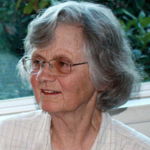Interviewer: Briana Goodwin, Dylan Bugden and Erin Wilson
Interview Date: February 3, 2014
Location: Snell Hall, Oregon State University
Duration: 1:34:19
Born to an Indiana flour miller, the second of four children, Roberta Hall studied at Duke University and worked in the Journalism Library and the Bookstore. Roberta then moved to Wyoming and continued to take courses, including anthropology. Later she became interested in the health field and almost walked away from anthropology, but in the end came out west to attend the University of Oregon. She lived in Salem with her husband, and became involved with a research project studying Russian Old Believers.
After earning her master’s degree in anthropology, Hall worked for four years at a university in Victoria, British Columbia as a biological anthropologist. The study of change and people’s adaptations over time has always fascinated Roberta, and her research included work with the BC Provincial Museum’s skeletal and archaeological collections. In 1974 Hall moved to Oregon State University, where she helped to shape and develop the university’s medical anthropology program. One very large project began in 1976 and involved repatriating human and animal remains, and recording the stories of the Coquille people.
After retiring in 2003, Hall rediscovered her interest in healthcare, hosting a healthcare forum radio show that involved local community as well as multiple Native American organizations across the region. Her other activities included involvement with the Sustainability Coalition, the Transportation Action Team, and progressive anti-war groups.
Dublin Core
Title
Description
After earning her master’s degree in anthropology, Hall worked for four years at a university in Victoria, British Columbia as a biological anthropologist. The study of change and people’s adaptations over time has always fascinated Roberta, and her research included work with the BC Provincial Museum’s skeletal and archaeological collections. In 1974 Hall moved to Oregon State University, where she helped to shape and develop the university’s medical anthropology program. One very large project began in 1976 and involved repatriating human and animal remains, and recording the stories of the Coquille people.
After retiring in 2003, Hall rediscovered her interest in healthcare, hosting a healthcare forum radio show that involved local community as well as multiple Native American organizations across the region. Her other activities included involvement with the Sustainability Coalition, the Transportation Action Team, and progressive anti-war groups.

